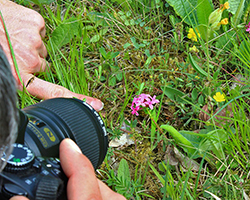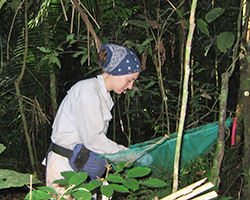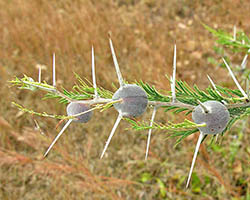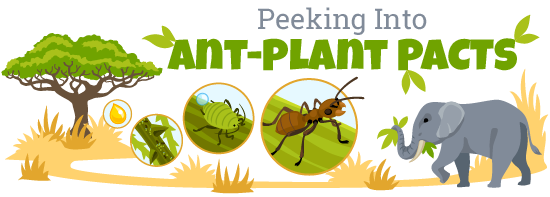Career Path for Elizabeth Pringle
Fast Facts:
- Number of years in school: 21
- Favorite class / subject: English
- Hardest class / subject: Physics
- First Job: Camp counselor
- Dream job as a kid: Supreme court judge
- One word you would use to describe your current job: Stimulating
“Of course, it was clearly destiny!” someone might say. “It was fated to happen,” another person might think, “Unavoidable!” Elizabeth Pringle is a biology professor, and looking at her family, you might not find this very surprising. However, her journey was never fixed in stone. She tried things out for herself and then followed what she loved to do.
A Family Thing
Growing up, Pringle was surrounded by biologists. Her mother is a professor and a hematologist (someone who studies blood). Her father is also a professor, although his research is on cells and genetics. It might be rare for both of someone’s parents to be biologists, but Pringle also has an older brother. Can you guess his job? Yep, another biology professor.

Yet Pringle doesn’t think that all these scientists at home are the reason she became a biologist. As a child, she originally wanted to be a supreme court judge, an astronaut, or a lawyer. It was her grandparents, the only ones in her family who were not professors, that most helped her learn to love biology.
In grade school, Pringle was assigned to make a plant collection. She asked her grandmother for help and they went off into the woods to collect seeds and leaves. Pringle was amazed when her grandmother knew the names of every plant they saw. “I couldn’t believe it. It was like she had been hiding this secret knowledge from me!” she recalls.
Even though they weren’t scientists, her grandparents loved nature and loved learning about the plants and animals where they lived. They even wrote their own field guide to Kentucky wildflowers. Pringle also came to appreciate and enjoy the outdoors, though she decided she wanted to become a lawyer who could help protect the environment.
Research Realizations

But in college she found something she loved even more…research. She decided to volunteer and do a little bit of lab work with Naomi Pierce, a professor at her college who was studying ants and butterflies. That’s when something just “clicked.” Pierce was an amazing scientist and a great mentor, and Pringle discovered that her own passion was doing experiments. Even after graduating college, she continued to work as a research assistant in several different labs.
These experiences helped her decide that she wanted to make biology research her career. In graduate school, she travelled to Central America, studying how special ants and trees can work together to help one other.

But it’s not just in Central America where she found this amazing teamwork. While on vacation to visit her brother (Pringle biology professor #3), Pringle found even more cooperation between trees and plants. This time, it was halfway around the world, in Africa. Pringle examined some trees that her brother said the elephants would not touch… and she found ants! Just like the ants she studied in graduate school, these angry ants would defend their trees from any intruder. Pringle decided to study how different plants and ants cooperate all around the world.
Looking back on her own career, Pringle laughs. It’s a bit funny to think of her family full of biology professors: her mom, her dad, her brother, and herself. However, she denies that she was “destined” to be a biologist. She could have been almost anything—well except an astronaut, apparently astronauts need to have perfect vision—but when she explored her interests, research was simply her favorite. It just goes to show that even if your path seems like it should be clear, it’s important to test your interests and see which one is the best fit.
Read more about: Peeking Into Ant-Plant Pacts
Bibliographic details:
- Article: Career Path: Elizabeth Pringle
- Author(s): Dr. Biology
- Publisher: Arizona State University School of Life Sciences Ask A Biologist
- Site name: ASU - Ask A Biologist
- Date published:
- Date accessed:
- Link: https://askabiologist.asu.edu/career-path-Elizabeth-Pringle
APA Style
Dr. Biology. (). Career Path: Elizabeth Pringle. ASU - Ask A Biologist. Retrieved from https://askabiologist.asu.edu/career-path-Elizabeth-Pringle
Chicago Manual of Style
Dr. Biology. "Career Path: Elizabeth Pringle". ASU - Ask A Biologist. . https://askabiologist.asu.edu/career-path-Elizabeth-Pringle
Dr. Biology. "Career Path: Elizabeth Pringle". ASU - Ask A Biologist. . ASU - Ask A Biologist, Web. https://askabiologist.asu.edu/career-path-Elizabeth-Pringle
MLA 2017 Style

Elizabeth Pringle didn't start out wanting to be a biologist, but experiences in nature and with different kinds of plants and animals won her over.
Be Part of
Ask A Biologist
By volunteering, or simply sending us feedback on the site. Scientists, teachers, writers, illustrators, and translators are all important to the program. If you are interested in helping with the website we have a Volunteers page to get the process started.

